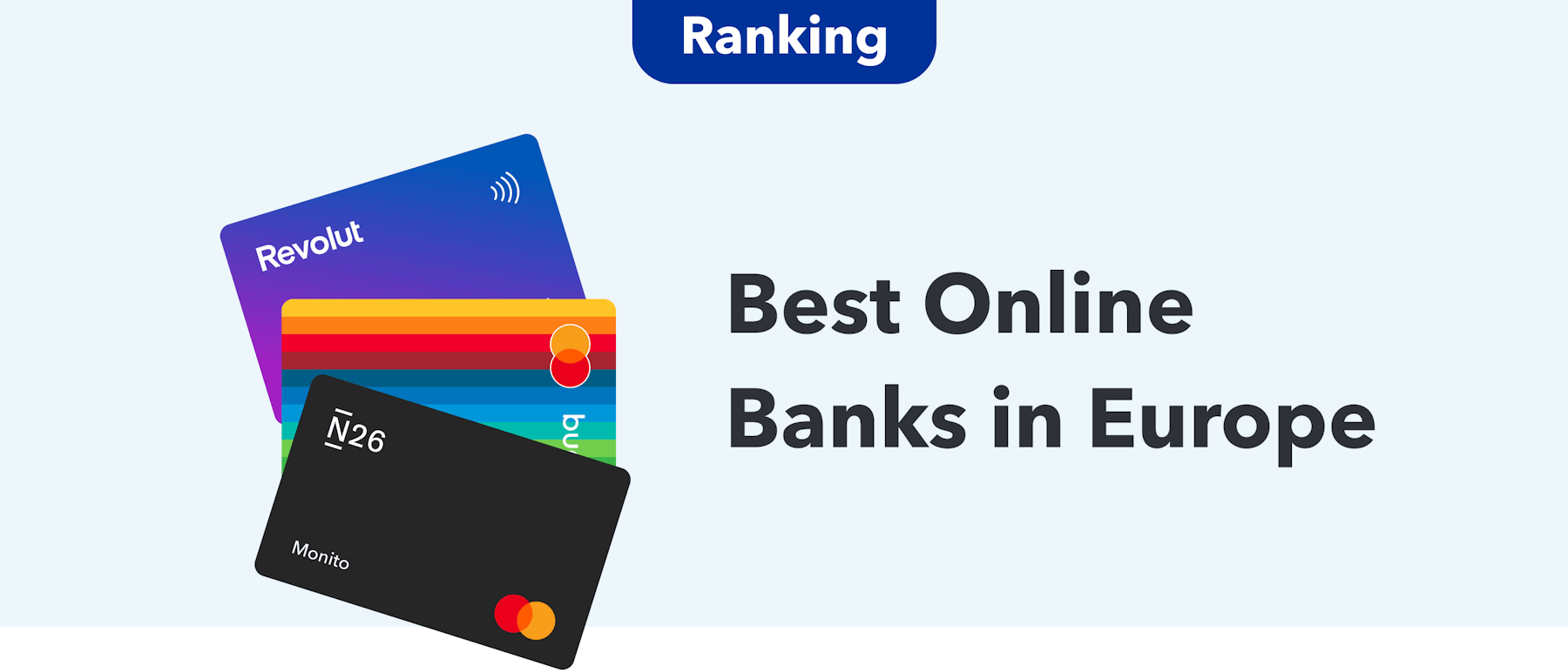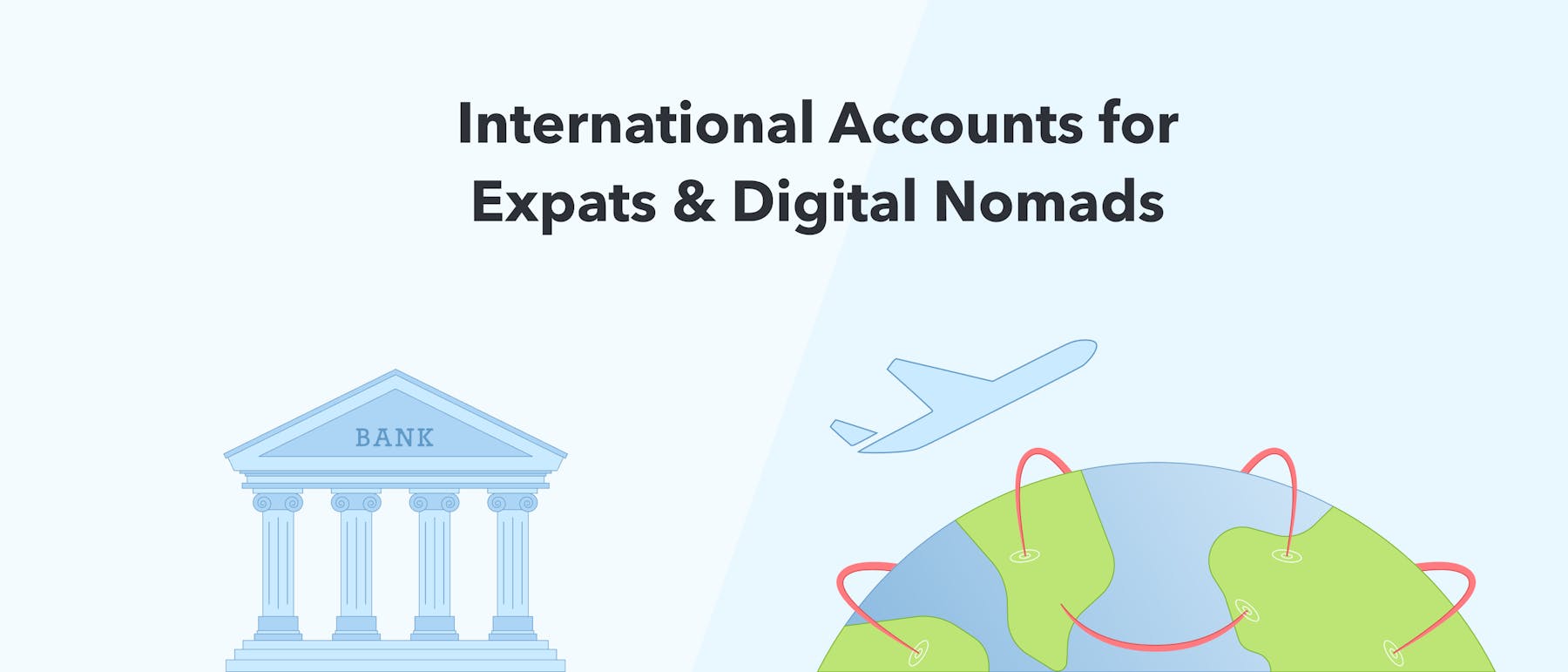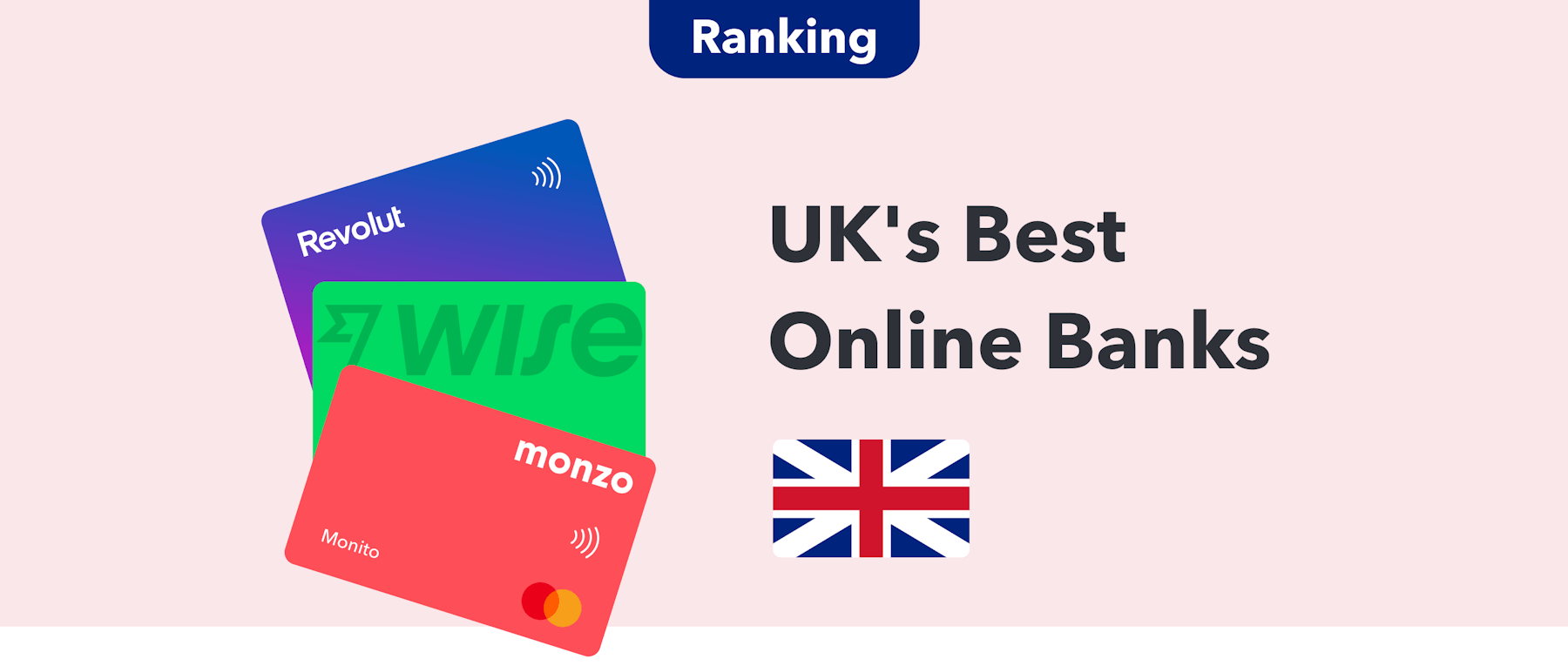- Languages English
- Country availability United Kingdom
- Services Full bank account
- Monthly fee Very low
- Card delivery time Mid
- Best for Everyday banking
- Bank details UK account no. & sort code
- Supported currencies Pound sterling
- Overdraft Yes
- Annual interest rate Low
- Supports cash deposits Yes
- International transfers Yes

Open a European Bank Account for Non-Residents and US Citizens (Even Online From Abroad)

Jarrod Suda
Guide

A writer and editor at Monito, Jarrod is passionate about helping people apply today’s powerful finance technologies to their lives. He brings his background in international affairs and his experiences living in Japan to provide readers with comprehensive information that also acknowledges the local context.
Byron Mühlberg
Reviewer
.jpg?auto=compress,format&rect=0,0,1629,1629&w=120&h=120)
Monito's Managing Editor, Byron has spent several years writing extensively about financial- and migration-related topics.
Links on this page, including products and brands featured on ‘Sponsored’ content, may earn us an affiliate commission. This does not affect the opinions and recommendations of our editors.
Read moreWhether you've just arrived in Europe or are planning to move there soon (for university, work, family, or anything else), one of the things you'll need to get in order is a local bank account. Navigating the European banking landscape can seem daunting, especially for non-residents.
Fortunately, the process should be fairly straightforward, even for non-residents, and you'll likely be able to open a bank account online in the EU without much issue. In this guide, we will walk through the European banking system, how to open a bank account in the EU/EEA for non-residents, and provide some of the best options to efficiently open accounts online.
Here are our recommendations if you're...
- not in possession of EU/EEA residence: A Wise Account can give you multi-currency bank details in nine currencies, including EUR account details.
- from the UK with no EU/EEA residence: Starling Bank offers a fully-fledged online current account for free for no monthly fees.
- in possession of EU/EEA residence: N26 gives you a European IBAN account number, a debit card to spend in euros, and access to full banking services.
Most newcomers and non-residents in the European Union find trouble opening bank accounts with traditional banks in Europe because you'll often need to show proof of legal EU residency. It's also challenging if you've landed in the EU to live with relatives, where you may not have any bills or rental contracts in your name.
In general, there are three common paths to open a European bank account. The best option for you to choose will depend on your residency status as well as your needs and preferences:
- High-street banks: This path requires proof of residency or citizenship in the country that you live in. This option is also open to non-residents who make significant investments or who manage legally established businesses in the European Economic Area. It's also best for those who need extensive banking services, such as loans or lines of credit, and don't mind the fees.
- Online banks: Although the application is more straightforward than at high-street banks, this path still requires proof of EU/EEA residence. It's best for those who want low-cost, digital banking services and don't mind slightly less banking coverage.
- Multi-currency accounts: This path provides an EU IBAN account without proof of address and is ideal for those wanting to open a European account online from abroad.
Without further ado, let's explore each of these paths in detail below:
How to Open a Bank Account in Europe for Non-Residents
- 01. What is banking like in Europe?
- 02. Path 1: Use a high-street bank
- 03. Path 2: Use an online bank (EEA & UK residents)
- 04. Path 3: Use a multi-currency account (Americans & non-residents)
- 05. Send money cheaply to your European bank account
- 06. Recapping the best non resident Euro bank accounts
- 07. FAQ about how to open a European bank account
Key Facts About Banking in Europe
| 🏦 No. of banks in the EU | 5,170+ |
|---|---|
| 👨⚖️ Regulatory body | EBA |
| 🏆 Best bank for residents | |
| 💸 Best money transfer to the EU | It varies. Compare now. |
| 💻 Best account for non-residents | |
| 💷 Average running costs |
|
Overview of Banking in Europe
Markus Spiske on Unsplash

The European banking landscape can be best understood by examining the composition and regulation of the European Economic Area (EEA).
The EEA encompasses 30 countries, which include the 27 member states of the European Union (EU) along with Iceland, Liechtenstein, and Norway. These EEA countries enjoy broad access to the EU single market, which is, in part, a territory without internal borders or other regulatory obstacles for the purposes of maintaining the free movement of goods and services. Despite having limited say in the decision-making processes and restrictions on certain goods, the three EEA countries are still key players in the single market.
Switzerland, while not an official EEA member, still enjoys a large degree of access to the single market through various one-to-one trade agreements with individual countries.
European Banking Regulators
The European Banking Authority (EBA) serves the EU banking sector, working to maintain financial stability and safeguard the integrity, efficiency, and orderly functioning of the banking system. However, countries like Iceland, Norway, Liechtenstein, and Switzerland, being non-EU members, rely on their own governmental banking and financial regulators to do the same. Similarly, the UK's financial industry falls under the regulation of the Financial Conduct Authority (FCA).
Currencies Across Europe
In terms of currency, the Euro (EUR) is the commonly accepted currency across the EU. Non-EU members like Norway, Iceland, and Liechtenstein use their own currencies: the Krona, Krone, and Franc, respectively, as does Switzerland with its Swiss Franc. The UK uses the Pound.
Despite this divergence in currency, the Single Euro Payments Area (SEPA) works to streamline cross border transfers within the bloc. SEPA, an EU initiative, simplifies bank transfers denominated in Euro, establishing a unified banking system across the region. This allows even non-Euro countries to execute non-cash Euro transactions, facilitating direct deposits, salaries, and payments throughout the Eurozone with ease.
Rise of European Online Banking
A prominent trend in the European banking sector is the steady decrease in the number of physical branches. This arguably stems from the soaring popularity of online and mobile banking, giving customers the freedom to conduct banking operations from the comfort of their homes, or anywhere in the world.
Path 1: Open a European High-Street Bank Account

One of the most traditional methods to open a bank account in the European Union is to visit a high-street branch, which include major players like HSBC, BNP Paribas, Credit Agricole, Santander, Barclays, and UBS. However, each country within the EU/EEA has major national and regional banks that cater accessible personal accounts to residents of that country too.
Essential Documentation for Opening a European Bank Account
To successfully open an account with a high-street bank in the EU, you'll need to provide:
- a valid form of identification;
- proof of legal EU residency;
- proof of residential address in the country.
For EU citizens, the process is usually straightforward and can often be completed online for added convenience.
A Unique Solution: Spain's Banking System
However, Spain provides an alternative path to banking in the EU. Unique among its European counterparts, Spain offers non-residents the opportunity to open bank accounts as long as they can present an NIE (Foreigner Identification Number). This process typically requires you to visit a local branch in person. Banks such as Santander offer accounts for non-residents.
If this route interests you, we recommend delving into our in-depth guide on the topic for more details and a step-by-step walkthrough.
Banking at Home With a Euro Account
A third, albeit less common, procedure to open a Euro-denominated account is via a high-street bank in your home country. Prominent multinational banks such as HSBC offer accounts in euros, widening the scope for banking in Europe. However, it's worth noting that these accounts often come with requirements such as high minimum balance, recurring monthly fees, and transaction costs for currency conversion.
Weighing these options with your specific banking needs in mind will help you make the optimal choice when opening a European high-street bank account as a non-resident.
Path 2: Open an Account With a European Online Bank (EEA & UK Residents)

Online banks, also known as "challenger banks" or "neobanks", are gaining popularity in the finance world. These can be either traditional banks operating online or companies specialising in financial technology. Unlike typical brick-and-mortar banks, these online institutions do not have physical branches but often offer more limited financial services. Nevertheless, they provide these services at almost no cost to you through easy-to-use web or mobile platforms.
Two well-regarded online banks are N26 and Starling Bank. Both are fully licensed by the competent authorities and operate exclusively through the internet. N26 is based in Germany and is open to residents in the EU as well as the EEA and Switzerland. It is unique for being one of the first online banks to run a loan program. Starling Bank, a UK bank, offers services only to UK residents. It provides a free UK account and additionally offers free Euro accounts, which allow customers to spend euros in the Eurozone using the Starling Bank debit card.
Let's survey some of the banking options available to residents and non-residents:
N26 — Best Free Current Account in the EU/EEA
Arguably the best-known mobile bank, N26 is a widely-used and much-loved German online bank with around seven million customers across the EU. N26 is also partnered with Wise's money transfer service, allowing in-app international money transfers at some of the best exchange rates on the market. Because of its complete current account offering, we recommend N26 to just about anybody interested in low-cost banking.
This option is available if you have residency in European Union countries or Iceland, Liechtenstein, Norway, or Switzerland.
- Account name: N26 Standard
- Account details: German IBAN
- Licensing: Bank
- Account maintenance: €0 /month
- Noteworthy features: Instant social payments, overdraft facilities, cash deposits, credit, insurance
- Availability: 22 European countries
- More info: See our full N26 review or visit the website.
Starling Bank — Best EUR Account for UK Residents
Starling Bank is a fully authorised bank in the UK that's well known for its fee-free current account. In fact, because this account is entirely free and gives you access to an impressively complete range of financial services, we think Starling offers the best online bank in the UK — one we recommend as a complete replacement for an account at a high-street bank.
- Account name: Personal Account
- Account details: UK sort code, EU IBAN
- Licensing: Bank
- Account maintenance: £0 /month
- Int'l transfer cost: 0.5% - 3% (depending on the currency)
- Int'l card payment cost: 0%
- Proof of UK residence required: Yes
- More info: See our full Starling Bank review or visit the website.
Yuh: Best Swiss Franc Account
Yuh is a Swiss neobank that's backed by Swissquote and PostFinance. It offers a Swiss franc (CHF) IBAN account and multi-currency functionality that allows you to hold in-app balanced in up to 13 other currencies, including EUR, USD, and GBP. Yuh also offers 'projects', which you can use to put money aside into dedicated account-like spaces to be saved for short-, medium-, and even long-term goals (with CHF, EUR, and USD balances all accruing interest).
Because it's available in Switzerland and for residents if Switzerland's neighbouring EU/EEA countries, we think it's the best CHF account in Europe and an excellent way to hold a balance in Swiss francs if that's something you find helpful.
- Account name: Yuh
- Account details: Swiss IBAN
- Licensing: Bank subsidiary
- Total cost: €0 per month.
- Noteworthy features: CHF bank account details, multi-currency balances.
- Availability: 6 European countries
- More info: See our full Yuh review or go to the website.
Path 3: Open a Multi-Currency Account as a Non-Resident

If you're a non-resident in Europe but need European banking details, online multi-currency accounts are an accessible solution. These accounts are not traditional banks but rather fintech companies, formally known as Electronic Money Institutions (EMIs). As their primary goal is to provide cost-effective global money transfers and currency exchanges, they often also include additional features such as a debit card, multi-currency account balances, and even foreign bank details.
Wise — Open a European Account as an American
Wise is a notable multi-currency account option that provides a Belgian IBAN, which is accepted throughout the Eurozone for SEPA transactions, direct deposits, and local ATM withdrawals. You don't need proof of residency in the Europe, but you'll need proof of residency in the either the EU/EEA, US, UK, Singapore, Japan, Australia, or New Zealand to access their services.
In addition to getting local account details for the EU, you'll get account details in the US, UK, Australia, New Zealand, Singapore, Romania, Canada, Turkey, and Hungary too. You can hold, exchange, and top-up up to 56 currencies and access those currencies at merchants with a travel debit card. Access to Wise's powerful international money transfer service right from your account balance.
- Account name: Multi-Currency Account
- Account details: Belgian IBAN and 9 others
- Licensing: Payment Institution
- Account maintenance: €0 /month.
- Noteworthy features: International money transfers, multiple account details, multi-currency balances, virtual debit cards.
- Availability: See all countries
- More info: See our full Wise Account review or visit the website.
Revolut — GBP and EUR Account For Eligible Residents
Revolut is a fully-fledged bank (licensed by the Bank of Lithuania and offering deposit insurance and products such as loans and credit cards) in parts of the EU, including France, Italy, Portugal, Estonia, Greece, Latvia, Romania, and a few others.
For non-residents of the EU, however, Revolut can only offer services as a holder of an e-money institution license. It does offer a Euro account with an EU IBAN to residents of the UK and EU/EEA. While Revolut's Euro account is not available in as many countries as Wise's accounts are, it is favoured for its travel insurance perks, low-cost international transfers, and competitive exchange rates.
- Account names: Standard, Plus, Premium, Metal, Ultra
- Monthly fee: Varies by plan (€0.00, €2.99, €8.99, €15.99, €50.00)
- Int'l transfer cost: 0.5% - 1.5%
- Int'l card payment cost: 0%
- Euro account availability: UK, EU, EEA residency
- More info: See our full Revolut review or visit the website.
Affordable Money Transfer to Your European Bank Account
When it comes to sending money abroad, traditional banks usually never provide the most cost-effective solution. Here is a breakdown of the standard fees levied by banks:
- Transfer fees: Traditional banks can add high fixed service fees to your transactions, sometimes reaching up to 20 to 50 euros per transfer.
- Exchange rate margins: Additionally, they may apply less favourable exchange rates. This is known as an exchange rate margin, where banks profit from the gap between the market rate and the rate they offer.
- Correspondent bank fees: In some scenarios, banks using the SWIFT network for international transfers might even impose correspondent bank fees. These are charges from intermediary banks involved in facilitating the transfer.
Best Money Transfer Services to European Bank Accounts
Luckily, online money transfer services provide a more affordable alternative. They specialise in international transfers, offering lower fees, stronger exchange rates, and no correspondent bank fees. According to the data from Monito from July 2022 to July 2023, the top six services for sending money to Euro accounts were the following:
Although we highly recommend these providers, rates can fluctuate, and the optimal service often depends on your location and your recipient's location. That's why we recommend using Monito's live comparison engine before you make your transfer. Compare rates and fees across various platforms, and choose the most cost-effective provider for your next international money transfer.
Find the best deal when sending money to banks in Europe:
Recap: What Are the Best Online Bank Accounts in Europe?
To conclude, let's recap the main recommendations we explored in this non-resident banking guide:
- N26: Best overall Euro account for EEA and Swiss residents.
- Starling Bank: Best Euro account for UK residents.
- Yuh: Best CHF and Euro account for Swiss residents.
- Wise: Best Euro account for non-EU/EEA residents.
- Revolut: Multi-currency account runner-up for EEA and UK residents.
See our guide on the best online-only banks in Europe for more.
FAQ About How to Open a European Bank Account
Can I open a European bank account as an American?
Yes, you can generally open a European bank account as an American if you have legal residency in an EU country. If you are a non-resident, Wise will still allow you to fully access Euro account details for free.
Which European country is easiest to open a bank account?
Spain is one of the easiest European countries to open a bank account as a non-resident, especially if you have an NIE (Número de Identificación de Extranjero).
What are the best European banks to open an account?
For the best European banks to open an account, Wise's multi-currency account is efficient for non-residents and Americans. N26 is highly recommended for the EU/EEA, while Starling Bank is excellent for the UK and Yuh for Switzerland.
Can I open up a bank account in Europe?
Yes, you can open up a bank account in Europe if you have legal residency in the country. If you are a non-resident, Wise will still allow you to fully access Euro account details for free.
Can a US citizen open a euro account?
Yes, a US citizen can open a euro account, particularly with Wise's multi-currency account.
Can I open a bank account in Italy if I am not resident?
In Italy, you typically need to be a resident or have a valid visa, such as an investor, student, business, or other legal status, to open a bank account. If you are a non-resident, Wise will still allow you to fully access Euro account details for free.
Can a non-resident open a French bank account?
You can open a French bank account on the high street if you are an EU/EEA resident. If you are a non-resident, Wise will still allow you to fully access Euro account details for free.
References Used In This Guide
1. European Banking Authority (EBA). European Union. Accessed 26 July 2023.
2. Banking industry in Europe - statistics & facts. Statista. Accessed 26 July 2023.
3. European Economic Area (EEA) Agreement. European Commission. Accessed 26 July 2023.
4. Single Euro Payments Area. Wikipedia. Accessed 26 July 2023.
5. Pricing. Revolut. Accessed 26 July 2023.
Compare Top Online Banks in Europe
Filter your results
Languages
See allCountry availability
34See allServices
Monthly fee
Card delivery time
Best for
See allBank details
See allSupported currencies
See allOverdraft
Annual interest rate
Supports cash deposits
International transfers
- Overall Monito Score
- Trust & Credibility
- Service & Quality
- Fees & Exchange Rates
- Customer Satisfaction
Filter your results
Languages
See allCountry availability
34See allServices
Monthly fee
Card delivery time
Best for
See allBank details
See allSupported currencies
See allOverdraft
Annual interest rate
Supports cash deposits
International transfers
- Starling Bank Monito Score 9.1
- Monzo Monito Score 9.0Monito Score
- Trust & Credibility
- Service & Quality
- Fees & Exchange Rates
- Customer Satisfaction
- Languages English
- English
- Country availability United Kingdom
- United Kingdom
- Services Full bank account
- Full bank account
- Monthly fee Very low
- Very low
- Card delivery time Fast
- Fast
- Best for Everyday banking +1
- Everyday banking
- Saving money
- Bank details UK account no. & sort code
- UK account no. & sort code
- Supported currencies Pound sterling +2
- Pound sterling
- US dollar
- Euro
- Overdraft Yes
- Annual interest rate High
- High
- Supports cash deposits Yes
- International transfers Yes
- Trust & Credibility
- Wise Multi-Currency Account Monito Score 8.9Monito Score
- Trust & Credibility
- Service & Quality
- Fees & Exchange Rates
- Customer Satisfaction
- Languages English +21
- English
- French
- German
- Spanish
- Portuguese
- Italian
- Polish
- Dutch
- Slovenian
- Polish
- Romanian
- Chinese
- Czech
- Norwegian
- Swedish
- Danish
- Hungarian
- Bulgarian
- Greek
- Croatian
- Latvian
- Lithuanian
- Country availability Austria +37
- Austria
- Belgium
- Bulgaria
- Croatia
- Cyprus
- Czech Republic
- Denmark
- Estonia
- Finland
- France
- Germany
- Greece
- Hungary
- Iceland
- Ireland
- Italy
- Latvia
- Liechtenstein
- Luxembourg
- Lithuania
- Malta
- Netherlands
- Norway
- Poland
- Portugal
- Romania
- Slovakia
- Slovenia
- Spain
- Sweden
- Australia
- Singapore
- Switzerland
- Japan
- United Kingdom
- United States
- New Zealand
- Malaysia
- Services Multi-currency account
- Multi-currency account
- Monthly fee Very low
- Very low
- Card delivery time Mid
- Mid
- Best for Spending while abroad
- Spending while abroad
- Bank details Euro IBAN +11
- Euro IBAN
- Hungarian account no.
- US account & routing no.
- UK account no. & sort code
- Australian account & BSB no.
- New Zealand account no.
- Canadian account
- transit
- institution no.
- Romanian account no.
- Singaporean account no. & bank code
- Turkish IBAN
- Supported currencies US dollar +50
- US dollar
- Euro
- Australian dollar
- Bulgarian lev
- Canadian dollar
- Swiss franc
- Czech koruna
- Danish krone
- Pound sterling
- Croatian kuna
- forint
- Japanese yen
- Malaysian ringgit
- Norwegian krone
- New Zealand dollar
- Polish zloty
- Romanian leu
- Swedish krona
- Singapore dollar
- Turkish lira
- United Arab Emirates dirham
- Chilean peso
- lari
- Moroccan dirham
- Pakistani rupee
- Tanzanian shilling
- Uruguayan peso
- ZMK
- Argentine peso
- Botswana pula
- Chinese yuan
- Egyptian pound
- Ghanaian cedi
- Indian rupee
- Kenyan shilling
- Mexican peso
- Ukrainian hryvnia
- Vietnamese Dong
- Costa Rican colon
- Israeli new shekel
- South Korean won
- Malaysian ringgit
- Thai baht
- Ugandan shilling
- CFA franc
- Bangladeshi taka
- Sri Lankan rupee
- Nigerian naira
- Philippine peso
- Russian ruble
- rand
- Overdraft No
- Annual interest rate Very low
- Very low
- Supports cash deposits No
- International transfers Yes
- Trust & Credibility
- Yuh Monito Score 8.6Monito Score
- Trust & Credibility
- Service & Quality
- Fees & Exchange Rates
- Customer Satisfaction
- Languages German +3
- German
- French
- Italian
- English
- Country availability Switzerland +5
- Switzerland
- France
- Liechtenstein
- Austria
- Italy
- Germany
- Services All-in-one finance app +1
- All-in-one finance app
- Multi-currency account
- Monthly fee Very low
- Very low
- Card delivery time Fast
- Fast
- Best for Trading stocks or cryptos
- Trading stocks or cryptos
- Bank details Swiss IBAN
- Swiss IBAN
- Supported currencies Swiss franc +12
- Swiss franc
- US dollar
- Euro
- Pound sterling
- Japanese yen
- Australian dollar
- Canadian dollar
- Swedish krona
- Hong Kong dollar
- Norwegian krone
- Danish krone
- United Arab Emirates dirham
- Singapore dollar
- Overdraft No
- Annual interest rate Low
- Low
- Supports cash deposits No
- International transfers Yes
- Trust & Credibility
- Revolut Monito Score 8.6Monito Score
- Trust & Credibility
- Service & Quality
- Fees & Exchange Rates
- Customer Satisfaction
- Languages English +20
- English
- German
- French
- Portuguese
- Spanish
- Dutch
- Slovenian
- Polish
- Romanian
- Italian
- Chinese
- Czech
- Norwegian
- Swedish
- Danish
- Hungarian
- Bulgarian
- Greek
- Croatian
- Latvian
- Lithuanian
- Country availability Austria +35
- Austria
- Belgium
- Bulgaria
- Croatia
- Cyprus
- Czech Republic
- Denmark
- Estonia
- Finland
- France
- Germany
- Greece
- Hungary
- Iceland
- Ireland
- Italy
- Latvia
- Liechtenstein
- Luxembourg
- Lithuania
- Malta
- Netherlands
- Norway
- Poland
- Portugal
- Romania
- Slovakia
- Slovenia
- Spain
- Sweden
- Australia
- Singapore
- Switzerland
- Japan
- United Kingdom
- United States
- Services All-in-one finance app
- All-in-one finance app
- Monthly fee Very low
- Very low
- Card delivery time Mid
- Mid
- Best for Spending online +1
- Spending online
- Spending while abroad
- Bank details UK account no. & sort code +1
- UK account no. & sort code
- Euro IBAN
- Supported currencies United Arab Emirates dirham +26
- United Arab Emirates dirham
- Australian dollar
- Bulgarian lev
- Canadian dollar
- Swiss franc
- Czech koruna
- Danish krone
- Euro
- Pound sterling
- Hong Kong dollar
- forint
- Israeli new shekel
- Japanese yen
- Mexican peso
- Norwegian krone
- New Zealand dollar
- Polish zloty
- Russian ruble
- Qatari riyal
- Romanian leu
- Saudi riyal
- Swedish krona
- Singapore dollar
- Thai baht
- Turkish lira
- US dollar
- rand
- Overdraft Yes
- Annual interest rate Very low
- Very low
- Supports cash deposits No
- International transfers Yes
- Trust & Credibility
- Conotoxia Multi-Currency Card Monito Score 8.6Monito Score
- Trust & Credibility
- Service & Quality
- Fees & Exchange Rates
- Customer Satisfaction
- Languages Polish +1
- Polish
- English
- Country availability Austria +28
- Austria
- Belgium
- Bulgaria
- Cyprus
- Czech Republic
- Denmark
- Estonia
- Finland
- France
- Germany
- Greece
- Hungary
- Iceland
- Ireland
- Italy
- Latvia
- Liechtenstein
- Luxembourg
- Malta
- Netherlands
- Poland
- Portugal
- Romania
- Slovakia
- Slovenia
- Spain
- Sweden
- United Kingdom
- United States
- Services Multi-currency account +1
- Multi-currency account
- Travel card
- Monthly fee Very low
- Very low
- Card delivery time Fast
- Fast
- Best for Spending while abroad
- Spending while abroad
- Bank details Euro IBAN
- Euro IBAN
- Supported currencies Euro +19
- Euro
- US dollar
- Pound sterling
- Swiss franc
- Australian dollar
- Canadian dollar
- Czech koruna
- Danish krone
- denar
- Japanese yen
- Mexican peso
- Norwegian krone
- New Zealand dollar
- Russian ruble
- Swedish krona
- Singapore dollar
- Thai baht
- Turkish lira
- rand
- Polish zloty
- Overdraft No
- Annual interest rate Very low
- Very low
- Supports cash deposits No
- International transfers Yes
- Trust & Credibility
- comdirect Monito Score 8.4Monito Score
- Trust & Credibility
- Service & Quality
- Fees & Exchange Rates
- Customer Satisfaction
- Languages English
- English
- Country availability Germany
- Germany
- Services Full bank account
- Full bank account
- Monthly fee Very low
- Very low
- Card delivery time Mid
- Mid
- Best for Everyday banking
- Everyday banking
- Bank details Euro IBAN
- Euro IBAN
- Supported currencies Euro
- Euro
- Overdraft Yes
- Annual interest rate Very low
- Very low
- Supports cash deposits Yes
- International transfers Yes
- Trust & Credibility
- Vivid Money Monito Score 8.3Monito Score
- Trust & Credibility
- Service & Quality
- Fees & Exchange Rates
- Customer Satisfaction
- Languages English +4
- English
- German
- French
- Spanish
- Italian
- Country availability Austria +26
- Austria
- Belgium
- Bulgaria
- Croatia
- Cyprus
- Czech Republic
- Denmark
- Estonia
- Finland
- France
- Germany
- Greece
- Hungary
- Ireland
- Italy
- Latvia
- Luxembourg
- Lithuania
- Malta
- Netherlands
- Poland
- Portugal
- Romania
- Slovakia
- Slovenia
- Sweden
- Spain
- Services Travel card +2
- Travel card
- Multi-currency account
- All-in-one finance app
- Monthly fee Very low
- Very low
- Card delivery time Fast
- Fast
- Best for Spending while abroad +1
- Spending while abroad
- Trading stocks or cryptos
- Bank details Euro IBAN
- Euro IBAN
- Supported currencies Albanian lek +40
- Albanian lek
- United Arab Emirates dirham
- Armenian dram
- Australian dollar
- Bosnia and Herzegovina mark
- Brazilian real
- Bulgarian lev
- Canadian dollar
- Chinese yuan
- Croatian kuna
- Czech koruna
- Danish krone
- Euro
- lari
- Pound sterling
- Hong Kong dollar
- forint
- Indian rupee
- Israeli new shekel
- Japanese yen
- South Korean won
- denar
- Malaysian ringgit
- Mexican peso
- Moldovan leu
- Moroccan dirham
- New Zealand dollar
- Norwegian krone
- Polish zloty
- Romanian leu
- Russian ruble
- Saudi riyal
- Serbian dinar
- Singapore dollar
- rand
- Swedish krona
- Swiss franc
- Thai baht
- Turkish lira
- Ukrainian hryvnia
- US dollar
- Overdraft No
- Annual interest rate Very low
- Very low
- Supports cash deposits No
- International transfers No
- Trust & Credibility
- Commerzbank Girokonto Monito Score 8.3Monito Score
- Trust & Credibility
- Service & Quality
- Fees & Exchange Rates
- Customer Satisfaction
- Languages German +1
- German
- English
- Country availability Germany
- Germany
- Services Full bank account
- Full bank account
- Monthly fee Very low
- Very low
- Card delivery time Fast
- Fast
- Best for Everyday banking
- Everyday banking
- Bank details Euro IBAN
- Euro IBAN
- Supported currencies Euro
- Euro
- Overdraft Yes
- Annual interest rate Very low
- Very low
- Supports cash deposits Yes
- International transfers Yes
- Trust & Credibility
- Tomorrow Monito Score 8.2Monito Score
- Trust & Credibility
- Service & Quality
- Fees & Exchange Rates
- Customer Satisfaction
- Languages German +1
- German
- English
- Country availability Germany +17
- Germany
- Belgium
- Estonia
- Finland
- Ireland
- Georgia
- Italy
- Latvia
- Lithuania
- Luxembourg
- Malta
- Netherlands
- Austria
- Portugal
- Slovakia
- Slovenia
- Spain
- Cyprus
- Services All-in-one finance app
- All-in-one finance app
- Monthly fee Moderate
- Moderate
- Card delivery time Mid
- Mid
- Best for Spending online
- Spending online
- Bank details Euro IBAN
- Euro IBAN
- Supported currencies Euro
- Euro
- Overdraft No
- Annual interest rate Very low
- Very low
- Supports cash deposits No
- International transfers No
- Trust & Credibility
- neon Monito Score 8.0Monito Score
- Trust & Credibility
- Service & Quality
- Fees & Exchange Rates
- Customer Satisfaction
- Languages German +3
- German
- French
- Italian
- English
- Country availability Switzerland
- Switzerland
- Services Full bank account
- Full bank account
- Monthly fee Very low
- Very low
- Card delivery time Fast
- Fast
- Best for Everyday banking +1
- Everyday banking
- Spending online
- Bank details Swiss IBAN
- Swiss IBAN
- Supported currencies Swiss franc
- Swiss franc
- Overdraft No
- Annual interest rate Very low
- Very low
- Supports cash deposits No
- International transfers Yes
- Trust & Credibility
- N26 Monito Score 8.0Monito Score
- Trust & Credibility
- Service & Quality
- Fees & Exchange Rates
- Customer Satisfaction
- Languages English +4
- English
- French
- Spanish
- German
- Portuguese
- Country availability Austria +20
- Austria
- Belgium
- Denmark
- Estonia
- Finland
- France
- Germany
- Greece
- Iceland
- Ireland
- Liechtenstein
- Luxembourg
- Netherlands
- Norway
- Poland
- Portugal
- Slovakia
- Slovenia
- Spain
- Sweden
- Switzerland
- Services Full bank account
- Full bank account
- Monthly fee Very low
- Very low
- Card delivery time Slow
- Slow
- Best for Everyday banking
- Everyday banking
- Bank details Euro IBAN
- Euro IBAN
- Supported currencies Euro
- Euro
- Overdraft Yes
- Annual interest rate Very low
- Very low
- Supports cash deposits Yes
- International transfers Yes
- Trust & Credibility
- Monese Monito Score 8.0Monito Score
- Trust & Credibility
- Service & Quality
- Fees & Exchange Rates
- Customer Satisfaction
- Languages English +11
- English
- French
- German
- Spanish
- Portuguese
- Italian
- Czech
- Estonian
- Lithuanian
- Polish
- Romanian
- Turkish
- Country availability Austria +30
- Austria
- Belgium
- Bulgaria
- Croatia
- Cyprus
- Czech Republic
- Denmark
- Estonia
- Finland
- France
- Germany
- Greece
- Hungary
- Iceland
- Ireland
- Italy
- Latvia
- Liechtenstein
- Luxembourg
- Lithuania
- Malta
- Netherlands
- Norway
- Poland
- Portugal
- Romania
- Slovakia
- Slovenia
- Spain
- Sweden
- United Kingdom
- Services All-in-one finance app
- All-in-one finance app
- Monthly fee Very low
- Very low
- Card delivery time Fast
- Fast
- Best for Easy registration
- Easy registration
- Bank details UK account no. & sort code +2
- UK account no. & sort code
- Euro IBAN
- Romanian account no.
- Supported currencies Euro +2
- Euro
- Pound sterling
- Romanian leu
- Overdraft No
- Annual interest rate Very low
- Very low
- Supports cash deposits Yes
- International transfers Yes
- Trust & Credibility
- Buddybank Monito Score 8.0Monito Score
- Trust & Credibility
- Service & Quality
- Fees & Exchange Rates
- Customer Satisfaction
- Languages Italian
- Italian
- Country availability Italy
- Italy
- Services All-in-one finance app
- All-in-one finance app
- Monthly fee Very low
- Very low
- Card delivery time Fast
- Fast
- Best for Everyday banking
- Everyday banking
- Bank details Euro IBAN
- Euro IBAN
- Supported currencies Euro
- Euro
- Overdraft Yes
- Annual interest rate Very low
- Very low
- Supports cash deposits Yes
- International transfers Yes
- Trust & Credibility
- illimity bank Monito Score 7.8Monito Score
- Trust & Credibility
- Service & Quality
- Fees & Exchange Rates
- Customer Satisfaction
- Languages Italian
- Italian
- Country availability Italy
- Italy
- Services All-in-one finance app
- All-in-one finance app
- Monthly fee Very low
- Very low
- Card delivery time Slow
- Slow
- Best for Everyday banking
- Everyday banking
- Bank details Euro IBAN
- Euro IBAN
- Supported currencies Euro
- Euro
- Overdraft Yes
- Annual interest rate Low
- Low
- Supports cash deposits Yes
- International transfers Yes
- Trust & Credibility
- DKB Monito Score 7.7Monito Score
- Trust & Credibility
- Service & Quality
- Fees & Exchange Rates
- Customer Satisfaction
- Languages English
- English
- Country availability Germany
- Germany
- Services Full bank account
- Full bank account
- Monthly fee Very low
- Very low
- Card delivery time Fast
- Fast
- Best for Everyday banking
- Everyday banking
- Bank details Euro IBAN
- Euro IBAN
- Supported currencies Euro
- Euro
- Overdraft Yes
- Annual interest rate Very low
- Very low
- Supports cash deposits Yes
- International transfers Yes
- Trust & Credibility
- Mooney Monito Score 7.5Monito Score
- Trust & Credibility
- Service & Quality
- Fees & Exchange Rates
- Customer Satisfaction
- Languages Italian
- Italian
- Country availability Italy
- Italy
- Services All-in-one finance app
- All-in-one finance app
- Monthly fee Low
- Low
- Card delivery time Fast
- Fast
- Best for Spending while abroad
- Spending while abroad
- Bank details Euro IBAN
- Euro IBAN
- Supported currencies Euro
- Euro
- Overdraft No
- Annual interest rate Very low
- Very low
- Supports cash deposits Yes
- International transfers No
- Trust & Credibility
- Widiba Monito Score 7.4Monito Score
- Trust & Credibility
- Service & Quality
- Fees & Exchange Rates
- Customer Satisfaction
- Languages Italian
- Italian
- Country availability Italy
- Italy
- Services All-in-one finance app
- All-in-one finance app
- Monthly fee Moderate
- Moderate
- Card delivery time Fast
- Fast
- Best for Easy registration
- Easy registration
- Bank details Euro IBAN
- Euro IBAN
- Supported currencies Euro
- Euro
- Overdraft Yes
- Annual interest rate Low
- Low
- Supports cash deposits Yes
- International transfers Yes
- Trust & Credibility
- Karta wielowalutowa Pekao Monito Score 7.4Monito Score
- Trust & Credibility
- Service & Quality
- Fees & Exchange Rates
- Customer Satisfaction
- Languages Polish
- Polish
- Country availability Poland
- Poland
- Services Multi-currency account +1
- Multi-currency account
- Travel card
- Monthly fee Very low
- Very low
- Card delivery time Mid
- Mid
- Best for Spending while abroad
- Spending while abroad
- Bank details Euro IBAN
- Euro IBAN
- Supported currencies Polish zloty +4
- Polish zloty
- Euro
- US dollar
- Pound sterling
- Swiss franc
- Overdraft Yes
- Annual interest rate Very low
- Very low
- Supports cash deposits Yes
- International transfers Yes
- Trust & Credibility
- bunq Monito Score 7.2Monito Score
- Trust & Credibility
- Service & Quality
- Fees & Exchange Rates
- Customer Satisfaction
- Languages English
- English
- Country availability Netherlands +29
- Netherlands
- Austria
- Belgium
- Bulgaria
- Croatia
- Cyprus
- Czech Republic
- Denmark
- Estonia
- Finland
- France
- Germany
- Greece
- Hungary
- Iceland
- Ireland
- Italy
- Latvia
- Liechtenstein
- Luxembourg
- Lithuania
- Malta
- Norway
- Poland
- Portugal
- Romania
- Slovakia
- Slovenia
- Spain
- Sweden
- Services Full bank account
- Full bank account
- Monthly fee Moderate
- Moderate
- Card delivery time Mid
- Mid
- Best for Everyday banking +3
- Everyday banking
- Easy registration
- Spending while abroad
- International money transfers
- Bank details Euro IBAN
- Euro IBAN
- Supported currencies Euro
- Euro
- Overdraft No
- Annual interest rate Very low
- Very low
- Supports cash deposits Yes
- International transfers Yes
- Trust & Credibility
Non-Resident Bank Accounts in the EU vs Other Countries
Many countries allow non-residents to open a bank account within their legal jurisdictions, but exactly what kind of requirements non-residents face can differ drastically from country to country and even bank to bank. See the list below to get a better idea of this:
Country | Which non-residents can open an account? |
|---|---|
Parties with close ties, expats, immigrants, investors, students | |
Any interested party | |
Parties with close ties | |
Parties with close ties, investors, students | |
Parties with close ties, Investors | |
Investors only | |
Parties with close ties, investors, students | |
Parties with close ties, investors, expats, students | |
Parties with close ties, investors | |
Parties with close ties, investors | |
Parties with close ties, investors | |
Parties with close ties, investors | |
Parties with close ties, investors | |
Parties with close ties, investors | |
Any interested party | |
Parties with close ties, investors | |
Investors only | |
Investors only | |
Parties with close ties, investors, expats | |
Parties with close ties, investors, expats | |
Any interested party |
Last updated: 18/2/2022
Country | Which non-residents can open an account? |
|---|---|
None | |
Parties with close ties, investors | |
Parties with close ties, investors | |
Any interested party | |
None |
Last updated: 18/2/2022
Country | Which non-residents can open an account? |
|---|---|
Any interested party | |
Any interested party | |
Parties with close ties, investors |
Last updated: 18/2/2022
Country | Which non-residents can open an account? |
|---|---|
Any interested party | |
Parties with close ties, investors |
Last updated: 18/2/2022
Other Guides On Non-Resident Bank Accounts



















Why Trust Monito?
You’re probably all too familiar with the often outrageous cost of sending money abroad. After facing this frustration themselves back in 2013, co-founders François, Laurent, and Pascal launched a real-time comparison engine to compare the best money transfer services across the globe. Today, Monito’s award-winning comparisons, reviews, and guides are trusted by around 8 million people each year and our recommendations are backed by millions of pricing data points and dozens of expert tests — all allowing you to make the savviest decisions with confidence.
Monito is trusted by 15+ million users across the globe.
Monito's experts spend hours researching and testing services so that you don't have to.
Our recommendations are always unbiased and independent.




